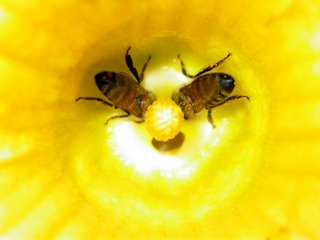Wednesday, November 29, 2006
Sniffer Bees
The AFP reported yesterday about a military announcement.
US military defense scientists have found a way to train the common honey bee to smell explosives used in bombs, a skill they say could help protect American troops abroad.
Scientists at the Los Alamos National Laboratory in New Mexico said in an online statement published Monday they had developed a method to harness the bee's exceptional olfactory sense.
The scientists used Pavlovian techniques on the bees' natural response to nectar, a sticking out of their tongue, or proboscis extension reflex.
By rewarding them with sugar water, the scientists taught bees to give the same reflex action when they were exposed to vapors from explosives such as dynamite, C4 plastic and TATP (triacetone triperoxide), often used by suicide bombers.
I'm not quite sure I understand how they'll be able to watch the bees when they're flying near luggage. The bee handlers will need to be able to see when the bees stick out their tongues, and that seems a bit tough under normal airport conditions.
Maybe they should use wasps, described in this vunet article dated October 24, 2005. With the wasps, they use a computer to detect the pattern that five wasps make inside a PVC container.
The trained hymenoptera are held in a cup-sized device, called a 'Wasp Hound', developed by the University of Georgia and US Department of Agriculture (USDA).
It is capable of sounding an alarm or triggering a visual signal, such as a flashing light, when the insects encounter a target odour.
Much easier than watching for a bee to stick out its tongue.
Subscribe to:
Post Comments (Atom)

2 comments:
Alternatively (and I think you'll agree with me) we could train bees to be the unholy servants of the night and use them against the insurgency.
Sick 'em, boys!!
Creative warfare is fun.
Jacob,
Good plan! But would the bees just stick their tongues out at the insurgents?
We might have to use the wasps.
Post a Comment